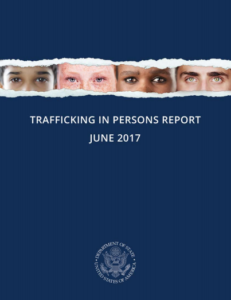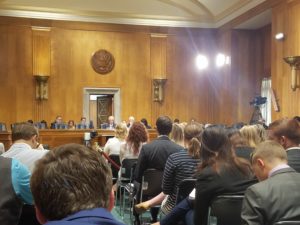Q: We keep hearing that passing these bills will end the internet as we know it? What do you think of these claims?
These claims are misplaced. For example, the Senate bill is a 4 page bill that simply clarifies how the CDA (passed in 1996) is affected by the TVPA, which was passed 4 years later. It retains the immunity provision for Good Samaritans and will not substantively expose any good actor to increased liability, stifle creativity, or affect free speech.
In 1996 Congress had many goals with the CDA, most of which are mentioned in the “Findings” and “Policy” sections of the CDA.[1] On the one hand, the Internet was in its infancy, and Congress wanted it to grow to its full potential. That being said, it also worried that this nascent industry might allow access to sexually explicit material on a new scale. Therefore, Congress struck a balance between these two concerns and passed the CDA as part of a wider system to limit the ability to access sexually explicit material online. Congress also wanted to prevent service providers from being sued for screening out this material. Thus, they created a Good Samaritan provision which protects Good Samaritan companies from being sued for their self- regulation to screen out explicit material. It was never intended to give immunity to bad actors not engaged in self- regulation, but engaged in illegal activity, but that is how the tech industry has argued the CDA should function.[2]
Over two decades later, the Internet is no longer fragile or in its infancy. Rather, it has developed significantly and is on very solid ground. It has also grown criminally and Congress has learned two important facts. First, the Internet is the largest marketplace where trafficking victims are sold. Second, that bad actors are misusing the Good Samaritan protection to insulate them from liability for their criminal activity, arguing that the CDA provides absolute immunity because they are service providers.
These legislative proposals are narrow. The Senate bill simply clarifies the CDA by including sex trafficking in the list of crimes Congress seeks to inhibit on the internet. All these proposals will do is clarify and update the CDA but they do nothing to limit the Good Samaritan exemption. Good Samaritans will continue to be protected just as they are now. Bad Samaritans will not.
Q: How do these bills hold some bad actors, like Backpage.com, accountable without chilling free speech on the internet?
The claim of First Amendment deprivations are also misplaced allegations designed to preclude any common sense discussion of clarifying the CDA. The First Amendment was intended to help a free and democratic society navigate these issues where criminality and speech can sometimes intersect. The Free Speech provision was never intended to have certain topics taken off the table never to be analyzed. These arguments that limiting internet service companies from partnering with bad actors to sell children online will chill speech are simply scare tactics designed to remove amending the CDA from any discussion.
The First Amendment is critical to our democracy, but has never been absolute. For example, it does not protect offers to engage in illegal transactions.[3] The CDA sought to address the problem of access to sexually explicit material online. Congress intended to encourage corporations to limit this material, by protecting them from litigation for their efforts to actively screen such information. Finding there was a disincentive to self-regulate, Congress explicitly stated one of its purposes was to remove this disincentive by encouraging limiting explicit material. As such, it drafted the CDA to balance these interests. As a result, §230(c)(1) recognizes that service providers cannot be treated like publishers of news and be held responsible for the third party content of news posted on their platforms. §230(c)(2) provides for immunity by protecting ISP’s from litigation for their actions to restrict access, NOT for other criminal actions. §230(e)(3) limits contrary state laws but does nothing to limit state efforts to enforce their laws consistent with the CDA.
Read Part 1 and Part 3 here.
By Mary G. Leary, Professor of Law, Catholic University of America, Shea Rhodes, Director of Villanova Law School’s Institute to Address Commercial Exploitation, Chad Flanders, Professor of Criminal Law and Constitutional Law Scholar, St. Louis University, and Audrey Rogers, Professor of Criminal Law and the Internet, Pace University.
—
[1] 47 U.S.C.A. 230(a) & (b).
[2] How Google’s Backing of Backpage Protect Child Sex Trafficking, Consumer Watchdog (May 2017).
[3] U.S. v. Williams, 553 U.S. 285, 297 (2008).
 Committee Chairman Bob Corker (R-TN) presided over the meeting. He was joined by Ranking Member Ben Cardin (D-MD), along with committee members Bob Menendez (D-NJ), Todd Young (R-IN), and Tim Kaine (D-VA). The Honorable John J. Sullivan, Deputy Secretary of State, and the Honorable Susan Coppedge, Ambassador-at-Large, Office to Monitor and Combat Trafficking in Persons represented the State Department as the hearing’s witnesses.
Committee Chairman Bob Corker (R-TN) presided over the meeting. He was joined by Ranking Member Ben Cardin (D-MD), along with committee members Bob Menendez (D-NJ), Todd Young (R-IN), and Tim Kaine (D-VA). The Honorable John J. Sullivan, Deputy Secretary of State, and the Honorable Susan Coppedge, Ambassador-at-Large, Office to Monitor and Combat Trafficking in Persons represented the State Department as the hearing’s witnesses.






